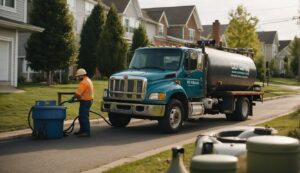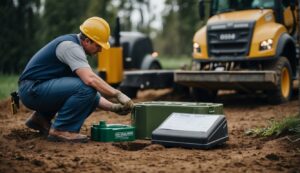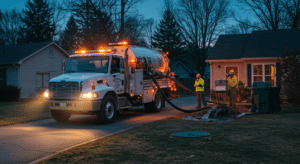Homeowners across New York State, particularly in Suffolk County, rely heavily on septic systems due to limited municipal sewer coverage. Understanding septic systems and upgrading options is crucial for environmental protection, health safety, and cost savings.
Here are comprehensive answers to 20 frequently asked questions (FAQs) regarding septic tanks and Innovative/Alternative Onsite Wastewater Treatment Systems (IA/OWTS).
1. What exactly is a septic system?
A septic system is an underground wastewater treatment setup used primarily where public sewer systems are unavailable. It typically includes a septic tank, a distribution box, and a drainfield. The system processes wastewater from household plumbing including toilets, showers, laundry, and sinks.
2. How does a septic tank operate?
Wastewater enters the septic tank where solids settle as sludge, and lighter substances float as scum. Anaerobic bacteria break down the waste, and clarified effluent moves into the drainfield, where soil naturally filters it.
3. What are IA/OWTS systems?
Innovative/Alternative Onsite Wastewater Treatment Systems (IA/OWTS) are advanced septic solutions designed specifically to reduce nitrogen levels and other pollutants more effectively than traditional systems, significantly protecting local ecosystems.
4. Why upgrade to an IA/OWTS system?
Upgrading enhances environmental safety by significantly reducing harmful nitrogen runoff, protecting groundwater, and complying with evolving local regulations. Additionally, homeowners can access grants and rebates through Suffolk County’s Septic Improvement Program.
5. How frequently should septic tanks be pumped?
Septic tanks require pumping every 3 to 5 years. The frequency depends on household size, usage habits, and system size. Regular maintenance prevents costly emergencies and prolongs system life.
6. What signs indicate septic system failure?
Common indicators include frequent plumbing backups, slow drains, unpleasant odors, soggy soil near the drainfield, and lush vegetation growth in drainfield areas. Timely action is crucial to prevent severe environmental and property damage.
7. What financial assistance is available for septic upgrades?
Suffolk County offers grants and low-interest loans specifically for homeowners upgrading to IA/OWTS systems. Bridgewater Environmental Services specializes in guiding homeowners through the application process to optimize funding opportunities.
8. How do I apply for septic upgrade grants?
Applying involves eligibility verification, submission of property and financial documents, and completing county-specific forms. Bridgewater Environmental streamlines this process, ensuring homeowners maximize available rebates.
9. What maintenance is required for IA/OWTS?
IA/OWTS systems need periodic inspections, consistent pumping, and servicing of mechanical components like pumps and sensors. Regular professional maintenance ensures system efficiency and regulatory compliance.
10. How long will my septic system last?
Traditional septic systems typically last 20-30 years if properly maintained. IA/OWTS may offer similar or longer lifespans, depending on the technology and adherence to maintenance schedules.
11. Can homeowners install septic systems independently?
Installation must meet stringent health and environmental regulations, typically requiring professional oversight. Bridgewater Environmental Services provides licensed professionals to ensure compliance and system integrity.
12. What permits are necessary for installing or upgrading septic systems?
Installation or upgrades require permits from local health departments, such as Suffolk County Department of Health Services. Professional septic companies facilitate the permitting process, ensuring adherence to local standards.
13. How does soil affect septic system functionality?
Soil type significantly influences wastewater absorption and purification. A percolation test assesses soil suitability, guiding appropriate system choices and placements.
14. What should never be flushed into septic systems?
Avoid flushing chemicals, pharmaceuticals, oils, grease, sanitary products, diapers, paper towels, and non-biodegradable items. These substances disrupt system function and accelerate failures.
15. How can I locate my septic system on my property?
Review property surveys, municipal records, or hire professionals to conduct site inspections. Proper identification facilitates efficient maintenance and servicing.
16. What is the function of a drainfield?
Drainfields consist of perforated pipes laid in gravel-filled trenches. They distribute treated effluent evenly into surrounding soil, allowing natural microbial processes to filter contaminants effectively.
17. Can septic systems contaminate groundwater?
Improperly maintained systems can lead to groundwater contamination through nutrient and pathogen infiltration. IA/OWTS significantly mitigate this risk due to their enhanced pollutant reduction capabilities.
18. How much does an IA/OWTS system installation typically cost?
Costs vary based on system complexity, property conditions, and specific regulatory requirements. Grants and rebates from Suffolk County dramatically reduce homeowner costs, making IA/OWTS financially accessible.
19. How does Bridgewater Environmental Services assist with septic upgrades?
Bridgewater Environmental provides end-to-end services, from initial consultation, securing funding, system design, permit management, and professional installation. Their expertise streamlines the entire upgrade process.
20. Where can I find additional reliable septic system information?
For further details, visit the Environmental Protection Agency’s septic system resource center, providing comprehensive guidance on system maintenance, environmental impact, and regulations.
Additional Considerations for Homeowners
Understanding septic system regulations in Suffolk County is crucial. Homeowners are encouraged to stay updated with evolving guidelines via local government resources. Maintaining septic system health protects not only individual property but the community’s environmental health and property values.
Bridgewater Environmental remains committed to guiding homeowners through every phase of septic management—from routine care and inspections to full system replacements and upgrades. Leveraging available financial incentives ensures homeowners achieve sustainable wastewater management affordably.
To discuss septic system concerns or explore upgrade options, contact Bridgewater Environmental Services today and take a step toward a healthier, environmentally responsible future.








